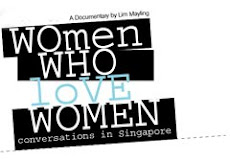Singapore gays find tacit acceptance, some seek more
by Amy Tan
"Homosexuals can change," a banner proclaimed from the side of a Singapore church that runs counselling sessions to steer gay people back onto the straight and narrow. Gay activists protested and the banner was removed.
Judging by the scope of the not-so-underground gay scene, the strait-laced city state is slowly moving towards quiet acceptance of its gay community. A hip dance club in the heart of town is packed with hundreds of muscular, sweaty men gyrating to pumping music.
Elsewhere on the island, other gay-friendly watering holes see a steady stream of customers. Shelves at major bookstores are stacked with a wide range of books on homosexuality ranging from gay history to romance. Local gay and lesbian Internet groups, some with several hundred members, have mushroomed. "I can't imagine these things that have gone on for so long escape the attention of the authorities," Alex Au, head of the informal gay and lesbian activist group People Like Us (PLU), told Reuters.
It is not illegal to be gay or lesbian in Singapore, but homosexual sex acts are illegal and can land people in jail -- even if they take place in private. Gays and lesbians have no legal protection against employment discrimination on grounds of their sexuality. Self-declared gay men in the military are relegated to administrative or logistics work. Other former British colonies sharing similar laws, such as Australia and Hong Kong, have long decriminalised homosexuality.
FAMILY AND BIRTH RATE
In Singapore, the government constantly harps on the need for traditional family units as the population ages and birth rates fall, but life for gays and lesbians appears little affected. "We actually lead very normal lives," says Wee Han, a 23-year-old writer. "I think there is always a discrepancy between the way we are ruled and governed and the way we live." Violent gay bashing is unheard of in Singapore, which generally boasts low crime rates. "Some people in Singapore really object to it but they still keep mum about it," says 19-year-old beauty consultant Celyn Png. "I can even kiss in public. People just stare."
But while commercial ventures catering to gays exist, the government has been less accommodating to homosexuals trying to raise their profile. "The further away you move from money towards speech, the more defined the restrictions coming your way," PLU's Au says. PLU, which started off as a gay social group, applied to the government to form a society to promote the understanding of homosexual issues in 1996 but was rejected after lengthy appeals. PLU plans for a public forum on gay issues in May 2000 was also scrapped after it failed to get the nod from authorities. The hit Broadway musical "Rent," which features two gay couples as central characters and on-stage kissing, made its local debut in February with a rating which barred under-18s.
"Five years ago they would have banned the play," says Gaurav Kripalani, artistic director of the Singapore Repertory Theatre which staged "Rent." "They are letting adults judge for themselves what they want to see and what they don't."
MORALS
Others in the gay community sense a growing acceptance. "They're beginning to realise that maybe it is not such a major issue," says a 37-year-old banker, who asked not to be identified. "Singaporean morals aren't going to get destroyed overnight just because gay people begin to live as gay people."
But Au does not see the government moving "inexorably towards liberalisation" and says anti-gay sex laws look set to stay. "I think the fundamental reason is not wanting to provoke the fundamentalists," he says. Senior Minister Lee Kuan Yew, renowned for his no-nonsense approach as Singapore's first prime minister, clarified the official stand on gays in a 1998 television interview. "It's not a matter which I can decide or any government can decide. It's a question of what a society considers acceptable," Lee said. "But what we are doing as a government is to leave people to live their own lives so long as they don't impinge on other people. I mean, we don't harass anybody."
Despite the quiet acquiescence towards gays and lesbians, there is room for more openess, Au says. "There's always underground freedom. The point must be what happens overground," he adds. "The issue is why aren't we given our due -- given legal equality, political recognition and social recognition above ground."
CHURCH BANNER
After the Church of Our Saviour put up the banner last year to promote its counselling sessions, the gay community quickly rallied online to gather signatures for a petition. The church still conducts the sessions but the banner has come down. In a written reply to the petition, the church said homosexuals did not have to change their orientation to join the church. They just had to moderate their behaviour.
"There has been much hospitality and grace extended by the church to people steeped in the homosexual lifestyle," it wrote. The ,Straits Times newspaper has cited three new lobbies jostling for the government's attention -- the ageing population, environmentalists and the gay community.
"For now, the gay lobby is most marked in its ability to purvey cultural norms because of the preponderance of homosexual themes in Singapore's art and entertainment scene," it wrote. "Whether it will turn out a socio-political force remains to be seen. But if the trend in other industrialised countries is any guide, the tide is towards acceptance of homosexuals, not criminalisation."
Au, a 48-year-old businessman who has been the single most outspoken member of the gay community, is confident there are now others to take up the cause. "It's reached the point where I'm not the only one who's active," he says."
Reuters: Singapore gays find tacit acceptance, some seek more
Sunday, July 1, 2001
Posted by Charm at 10:06 PM 0 comments
Labels: Homosexuality, Reuters, Singapore
Subscribe to:
Posts (Atom)





